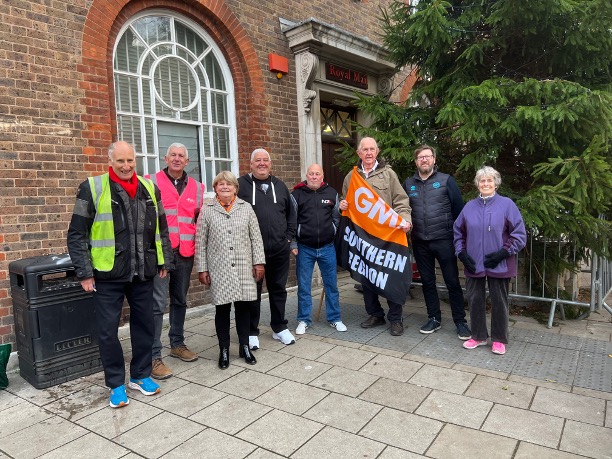Twickenham Labour Party Twickenham Constituency Labour Party covering Twickenham, Fulwell, the Hamptons, Heathfield, St Margarets, Teddington and Whitton

Members of the Twickenham CLP were on the CWU picket line in Teddington recently. We spoke to some striking postal workers about the reasons for their industrial action.
The Communications Workers Union (CWU) says that the strike resulted from having an unagreed two per cent pay deal imposed upon its members. But, speaking on condition of anonymity because of fears of retribution from management, one of the postal workers revealed that it’s about more than just money. “This strike is fundamentally about terms and conditions”.
Last year, the Royal Mail Group (RMG) and the CWU agreed the ‘Pathway to Change’ strategy: this described how the Post Office needed to restructure to ensure it could thrive in the future. The section on culture set out in the document states that, “local managers, CWU Representatives and employees are encouraged and empowered to agree local solutions on day-to-day operational issues.”
However, as the CWU states on its RMG Strike web page, “The Royal Mail company leadership has reneged on the Pathway to Change agreement’s Key Principles and has begun to impose changes without negotiation and without agreement.” This is being felt ‘on the ground’ in Twickenham as the steady erosion of working conditions.
A Trail of Broken Promises
“This is an inevitable result of privatisation and things have been going downhill a lot faster in the last four months since new management was put in place,” said one postal worker. “And I’m sure their behaviour serves a larger agenda – profits are being pursued at the expense of people and staff are no longer being treated with any respect or dignity. It’s like we’re going back to the bad old days of the seventies.”
Specific examples of the RMG backtracking on its commitments are the erosion of sick pay, the breaking of an agreement not to implement compulsory redundancies and assurances that technology would not be used for ‘exploitative practices’. “We were given PDAs (Personal Digital Assistants and told that these were simply to record the safe delivery of parcels. But now they are being used, without any consultation, to track our movements.”
The Amazonisation of the Postal Service
“I’m convinced that the intent of the owners is to reduce the status of post office employees to ‘gig economy’ workers,” said one. “But the Post Office is not Amazon – it is a national institution with a history going back 500 years.”
In many places, particularly rural communities, the postie is not merely a public servant but a pillar of the community. “For many people, the postie might be the only friendly face they see. And if there’s milk bottles building up outside, we’re the ones that will knock on the door to make sure everything is ok.”
He said that the increased use of casual workers by RMG has resulted in a lowering of standards. Examples of poor practices that he quoted included: parcels being ‘doorstepped’ – left by front doors rather than a delivery slip being provided (something that is against the code of practice); increased incidence of items going missing; and a higher level of complaints. “We have a commitment to service and to standards that you don’t find with the likes of Amazon,” said one.
“They say that they can’t make money on letters, but the Post Office still posted profits of over £700 million last year. And ‘casuals’ operating their own vans are getting £27 an hour, whereas we are getting less than half of that. So, there is money, but it’s going into the pockets of shareholders rather than ensuring postal workers can earn a decent living wage.”
As the CWU page states, “We want to change this Great British company together and by consent.” The RMG want to implement change unilaterally and by diktat. It’s no way to run a company – and no way to treat our postal workers.
